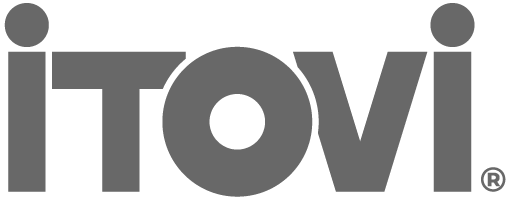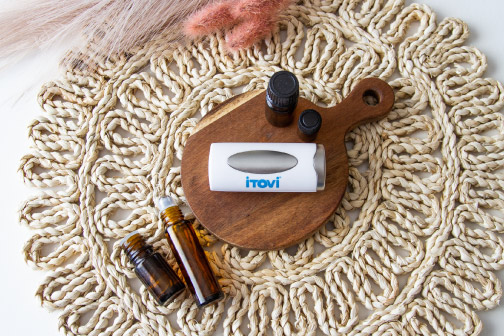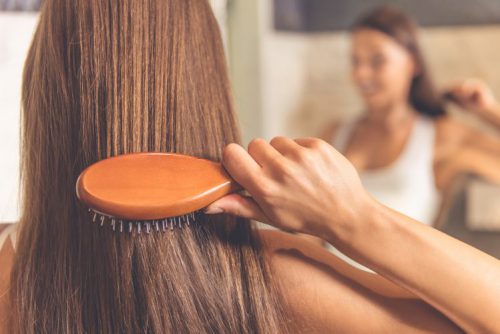
Eating the right amount of food is surprisingly tricky!
Despite the modern convenience of nearby grocery stores, restaurants, food delivery, and nutrition-tracking apps—eating the right amount of food every day can still be a challenge!
You have to deal with 101 online opinions as to how many calories you should be consuming based on your age, weight, goals, and other factors. You may have to deal with dysregulated hunger cues or an unhealthy psychological relationship with food. And you need to keep your daily diet and relationship with food from being hijacked by modern peer-pressuring stigmas, beauty expectations, and stereotypes.
Not to mention it can be hard to eat regular, healthy meals when you live in a chaotic modern world with a fast-moving lifestyle!
It is possible to achieve a healthy relationship with food. It is possible to enjoy the rich wellness benefits of eating the right amount of adequately healthy food every day.
But there are some land mines you’ll have to avoid (see above) and things you’ll have to learn to get there.
Ready to get started?
Developing a healthy relationship with food
If you lead a busy life, it can be easy to see food as a nuisance and your regular need to prepare (or simply find) food to eat as a chore.
And if you are determined to lose weight or change your body composition, it can be easy to see food, especially tasty foods, as the enemy.
But food should not be your enemy. And eating should not be a chore. Your body is designed to thrive off of food! Your taste buds, your serotonin-producing gut, your gut-brain axis, and more are all meant to help you enjoy food and the regular experience of eating meals!
And you have even more parts of your body—your brain, nervous system, immune system, cardiovascular system, ecosystem of gut bacteria, and more—that need to be fueled daily by what you eat!
If all that’s not enough (which, biologically, it should be), to show why food shouldn’t be your enemy, remember, food is also an enormous part of our closest and most valued social relationships, a part of our cultures and heritages, and it has a unique role to play in our daily management of stress.
That said, food should not be your god. It should not be your single highest source of pleasure. Nor should it be your default solution to stress. There should be some degree of awareness and self-control to your eating habits. And, yes, for the sake of your health, the tastiest option isn’t always the best option.
(Some cravings are biologically helpful. Some are not.)
So, how do we sort through it all and develop a healthy relationship with food? The answers are found in 1) understanding the relationship between stress and food and then 2) balancing ourselves between diet tracking and intuitive eating.
The relationship between food and stress
The beginning is simple—if you don’t eat regularly (and if you don’t eat the sort of things your body needs), then your body is going to be increasingly stressed!
The popular word “hangry” embodies this idea: that our mental and physical well-being is significantly impacted, day by day, by whether we have recently had enough to eat! Not enough food equals stress and poor health. Simple as that.
Your body was not built to be in constant starvation mode!
Eating not only provides your body with the fuel it needs to be healthy. The act of eating also triggers the vagus nerve, stimulates the smell and taste senses, and often comes in the company of relaxation, a mental break, and/or positive social interactions, all of which reduce stress! Who knew that stopping for lunch could do so much to lower our stress levels!
When Stress Sabotages Your Relationship With Food
Truth be told, a significant increase OR decrease in appetite is a sign of too much stress. Healthy people are regularly (but not excessively) hungry and are eating regularly. Neither binge eating NOR skipping meals are a sign of health—quite the opposite!
We need to avoid neglecting our hunger cues because doing so (that, and certain health conditions) can throw our hunger cues off and get us into unhealthy patterns of over-restricting and/or binge eating.
However, we also need to watch our stress and avoid using food to fight stress that is not hunger-related! Because your body knows that it needs regular food to avoid “hangry” stress and that the act of eating can be de-stressing, we may be tempted to eat when we are not hungry but we are stressed. This “emotional eating” is ultimately harmful to both our physical and emotional health.
Certain diets and even controlled levels of fasting may be helpful in improving your physical and emotional health. But dieting should never be allowed to push you over the edge to excess stress OR be allowed to compromise your relationship with food.
So, watching our hunger levels and our stress levels is paramount!
The following section “Diet tracking vs Intuitive Eating” will help you learn to manage or correct your body’s relationship with hunger cues.
The iTOVi Scanner, plus other helpful methods like body scan meditations and the FCAS method, can help you monitor your stress levels and manage your stress so you can avoid emotional eating (more on this later).
Diet Tracking vs Intuitive Eating
Both diet tracking and intuitive eating have benefits. Each method helps increase your nutritional awareness in different ways and helps with different food-related, nutrition problems.
There may be times when diet tracking will benefit you more. And there may be seasons in your life when intuitive eating is more what you need.
Understanding what each of them is good for will help you know which style you should utilize.
The Benefits of Diet Tracking
Diet tracking, which may include using nutrition-tracking apps or following a specific diet (Mediterranean, keto, paleo, self-made, etc), increases your awareness of:
- Exactly what you are eating
- How much you are eating
and
- If your diet is balanced
It is amazing how many people think that they “generally eat pretty healthily”, but find, after just a few days or weeks of diet tracking, that they are over-eating, under-eating, eating mostly carbs, have no healthy fats in their diet, etc!
(For more information on healthy food choices and macro nutrient balance, visit part 2 of iTOVi’s Nutrition Guide).
If weight loss is your goal and you want to deliberately consume a caloric deficit or you are looking to adjust your macro balance for better fitness gains, energy, etc, then diet tracking is the best method to make sure you are meeting your goals!
| What is a caloric deficit? |
| The energy your body gets from your diet and uses to live is measured in energy units called “calories”. If you consume fewer calories than your body uses, you are likely to lose weight. The average, sedentary adult human burns roughly 2,000 calories per day (this can vary quite a bit though depending on your size, gender, activity level, and even, for women, what part of your menstrual cycle you are in). A “caloric deficit” would be created by eating less calories than your body is burning in a day.
Note that it is generally held to be unhealthy, and therefore counter-productive to your health goals, to maintain a caloric deficit of more than 500 calories per day. |
And remember, just because you are dieting doesn’t mean you don’t try to savor and enjoy your food! Or that you eat repetitive or bland meals! Break out the spices and try new flavors so you can enjoy your food and maintain your diet!
The Benefits of Intuitive Eating
Intuitive eating is the practice of “following your body” when it comes to your diet. This means you eat when you are hungry, pay attention, and stop when you are full or “satiated”.
Advocates of intuitive eating also suggest eating what your body wants.
Intuitive eating increases your awareness of your body, including your hunger cues, your energy levels, your cravings, your stress levels, and your bodily experience with food.
Your body knows what it needs. The better you get at listening to your body and understanding what it is really asking for, the more “at home” you will feel with your body, the healthier you will feed, and the better your relationship with food will be!
And you can maximize the benefits of intuitive eating by being sure to eat slowly and mindfully! This will help you attune to your body, enjoy your food more, and reduce stress.
After all, food isn’t just fuel. It’s bodily connection, sometimes social connection, and stress relief—so don’t waste it!
You may prefer…
| Diet tracking if… | Intuitive eating if… |
|
|
A quick note: Eating disorders, Childhood wounds, and Self-advocating
Healthy children do intuitive eating and self-advocating so naturally!
Although they may lack a great deal of self-control when it comes to tasty treats, children do have a remarkable sensitivity to their own flavor preferences, hunger cues, and satiety cues. And most importantly, children typically don’t feel the need to feel self-conscious about their bodies or about what they eat.
Also, by virtue of the fact that they are so attuned to their desires, children tend to be naturally uninhibited in the ways that the self-advocate – the ways they go for what they want and need, stand up and speak up for themselves, unabashedly ask others for help when they need it, etc.
Eating disorders—those that cause us to eat too restrictively OR too much—often find their root in some disruption or trauma that our childhood self or “inner child” has suffered. Possible examples may include emotional or physical neglect or emotional or physical abuse, especially stinging criticisms of our manners or appearance.
As such, an important part of overcoming eating disorders is often the “reparenting” process in which we learn, or relearn, how to love ourselves and self-advocate for our various physical and emotional needs.
We can all benefit from “checking in” with our inner child, learning to track and understand our emotional stress, and learning how to better process our emotions (especially those tied to old wounds).
In combating eating disorders, we may also benefit greatly from professional counseling and/or the support of a community, either a formal support group of people struggling with similar issues or a support network of close friends and family members.
Conclusion
In today’s world, there is far too much shame associated with how much and what we eat!
If you take anything from this part of the iTOVi Nutrition Guide, let it be that your relationship with food should center around loving yourself!
Your relationship with food was meant to bring you sustenance, joy, social connection, and a bit of stress relief!
So never let your nutrition plan become something you use to torture yourself!
Savor life! And if you aim to improve your nutritional habits, let it be a journey of patience, love, and self-attunement! You deserve no less.
- Part 1: Nutritional Introduction
- Part 2: Nutritional Balance
- Part 4: Nutritional Timing
- Part 5: Women’s Nutrition
- Part 6: Nutritional Support with iTOVi




